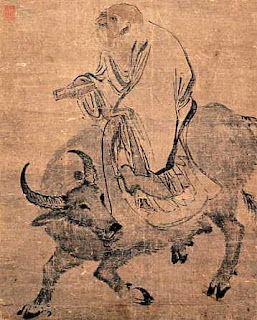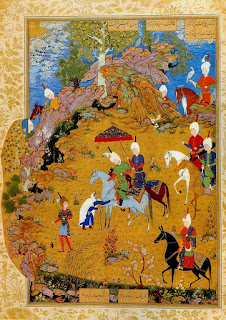The Mazeppist
A Transgressive Transcendentalist manifesto.
About Me

- Name: Sidi Hamid Benengeli
- Location: Dar ul-Fikr, Colorado, United States
Part Irish, part Dervish, ecstatic humanist, critical Modernist, transgressive Transcendentalist.
Sunday, November 29, 2015
Friday, November 27, 2015
From Yunus Emre's Divan CLXXIX
I am not permanent here; I came here to leave.
I am a merchant with many goods I came to sell.
I did not come to fight, I came for love.
The house of the Friend is the heart; I came to heal hearts.
My madness is because of the Friend; those who are in love understand.
Changing the duality, I came to reach oneness.
He is my teacher and I am his servant; I am the nightingale of the garden of the Friend.
In the garden of the Friend, I came to be happy and sing.
Those who cannot know each other here, cannot know each other in the Hereafter.
I came here to become acquainted with my Friend and to explain my situation.
Yunus Emre has fallen in love and has died of love.
I came to explain my situation at the gate of the true Friend.
(tr. Zekeriya Baskal)
Thursday, November 26, 2015
Wednesday, November 25, 2015
From Yunus Emre's Divan XXIX
Not talking at all is the best way to talk,
Talking is the dirt of souls.
The one who does not consider all people the same
Might be a saint in law but is a rebel in reality.
We are students and we constantly study the course of love;
God assigns the course and love itself is the teacher.
O beloved! Let me tell you something about reality of the things,
The infidel in reality is the saint of law.
(tr. Zekeriya Baskal)
Talking is the dirt of souls.
The one who does not consider all people the same
Might be a saint in law but is a rebel in reality.
We are students and we constantly study the course of love;
God assigns the course and love itself is the teacher.
O beloved! Let me tell you something about reality of the things,
The infidel in reality is the saint of law.
(tr. Zekeriya Baskal)
Tuesday, November 24, 2015
Sunday, November 22, 2015
Friday, November 20, 2015
Thursday, November 19, 2015
Wednesday, November 18, 2015
Tuesday, November 17, 2015
Romantic Modernism: Wittgenstein and Heidegger
From the General Introduction to Wittgenstein and Heidegger, edited by Egan, Reynolds, and Wendland, Routledge (2013), p. 17:
…Anthony Rudd’s focus is the fusion of modernism with romanticism. The principal claim of “Wittgenstein and Heidegger as Romantic Modernists” is that both Wittgenstein and Heidegger inherit a romantic vision in which Cartesian dualism is overcome through a “re-enchantment” of the world. Rudd describes how early twentieth-century modernism involved a revival of this romantic outlook, amounting to a romantic modernism, and he contends that Wittgenstein and Heidegger should be seen as its philosophic representatives. He concedes that the romantic vision did have to struggle against countervailing tendencies in both philosophers, but suggests that this conflicted outlook was itself characteristic of the modernist revival of romantic themes.
It strikes me that Rudd, a philosophy professor at St. Olaf College, has got it just right.
…Anthony Rudd’s focus is the fusion of modernism with romanticism. The principal claim of “Wittgenstein and Heidegger as Romantic Modernists” is that both Wittgenstein and Heidegger inherit a romantic vision in which Cartesian dualism is overcome through a “re-enchantment” of the world. Rudd describes how early twentieth-century modernism involved a revival of this romantic outlook, amounting to a romantic modernism, and he contends that Wittgenstein and Heidegger should be seen as its philosophic representatives. He concedes that the romantic vision did have to struggle against countervailing tendencies in both philosophers, but suggests that this conflicted outlook was itself characteristic of the modernist revival of romantic themes.
It strikes me that Rudd, a philosophy professor at St. Olaf College, has got it just right.
Sunday, November 15, 2015
A Blessing From The Black Forest Daoist Dervish
No matter how the decision may turn out regarding history and the lack of history, the questioners [those who have broken the habit of curiosity, whose seeking loves the abyss, in which they know the oldest ground], who in thought prepare that decision, must be; may they all bear the solitude in their greatest hour.
--Martin Heidegger, Contributions, tr. Rojcewicz and Vallega-Neu, p. 13.
Friday, November 13, 2015
Tuesday, November 10, 2015
Monday, November 09, 2015
Old Fitz & T. S. Eliot
But there came a moment at about the age of fourteen, which he clearly remembered, when he picked up a copy of The Rubaiyat of Omar Khayyam, as translated by Edward Fitzgerald. The entry into the bright world of the poetic line was, he said, 'overwhelming'; he compared the experience to that of conversion, since the world itself seemed renewed and painted with 'bright, delicious and painful colours'. 'Painful', perhaps, because within the declamatory music of Edward Fitzgerald he glimpsed an image of the world, and of himself, larger than any he had known before.
--Peter Ackroyd, T. S. Eliot: A Life (1984), 26.
--Peter Ackroyd, T. S. Eliot: A Life (1984), 26.
Sunday, November 08, 2015
Daoist Dervish Song
Home is where one starts from. As we grow older
The world becomes stranger, the pattern more complicated
Of dead and living. Not the intense moment
Isolated, with no before and after,
But a lifetime burning in every moment
And not the lifetime of one man only
But of old stones that cannot be deciphered.
There is a time for the evening under starlight,
A time for the evening under lamplight
(The evening with the photograph album).
Love is most nearly itself
When here and now cease to matter.
Old men ought to be explorers
Here or there does not matter
We must be still and still moving
Into another intensity
For a further union, a deeper communion
Through the dark cold and the empty desolation,
The wave cry, the wind cry, the vast waters
Of the petrel and the porpoise. In my end is my beginning.
[From T.S. Eliot's Four Quartets, "East Coker"].
Saturday, November 07, 2015
Friday, November 06, 2015
For The Few--For The Rare
For the few, who from time to time question again, i.e., newly put the essence of truth up for decision.
For the rare, who are endowed with the great courage required for solitude, in order to think the nobility of beying and to speak of its uniqueness.
--Martin Heidegger, Contributions, tr. Rojcewicz and Vallega-Neu, pp. 11-12.
Thursday, November 05, 2015
Wednesday, November 04, 2015
From Wonder Into Wonder
Back in 1979, I was sitting in the cramped private library of a friend (who happened to be an Episcopal priest) chatting about all manner of things (although what, specifically, I do not recall). When I got up to leave, he, too, arose and said, "Wait a minute, there is something I would like to give you." He then walked over to a bookshelf and pulled out a copy of Witter Bynner's somewhat loose renderings from the Tao-te-ching (pictured). I was a little perplexed by the gift as I had never heard of the book or of its purported author, Lao-tzu. Nevertheless, despite my evident perplexity, I thanked my friend and promised to read it when I had the chance.
A few weeks later, I picked up his little gift and started to read the opening poem. About halfway through, I had to close both the book and my eyes--for my mind was reeling. After a few moments passed, I re-opened both and began again from the beginning:
Existence is beyond the power of words
To define:
Terms may be used
But are none of them absolute.
In the beginning of heaven and earth there were no words,
Words came out of the womb of matter;
And whether a man dispassionately
Sees to the core of life
Or passionately
Sees the surface,
The core and the surface
Are essentially the same,
Words making them seem different
Only to express appearance.
If name be needed, wonder names them both:
From wonder into wonder
Existence opens.
Who was this Lao-tzu, I marveled, and where did he get his profundity? My fascination turned quickly into agitation, however, because, at the tender age of 19, I had pretty much decided that the "Wisdom of the West" was unrivaled (a conclusion reached without having considered a shred of evidence from "Eastern" sources). Looking back, I surmise that this prejudice of mine was all too apparent to my priest-friend (then a man in his sixties) and so he decided to gently awaken me to some of the wonders of the wider world (he was an unusual priest).
Though I later thanked him profusely for the gift, I doubt that either one of us ever quite comprehended the impact that reading Lao-tzu had on me (then or now).
From wonder into wonder/Existence opens...









































